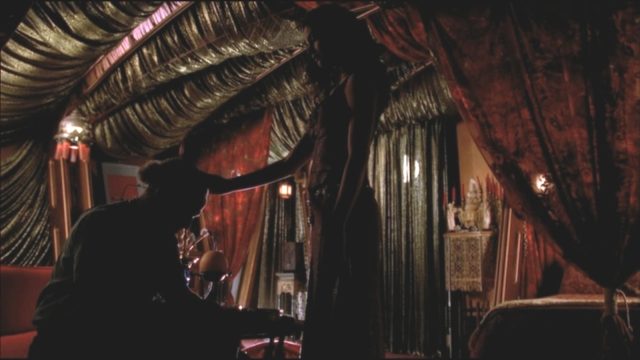There’s a scene at the end of “Shindig” that fascinates me. Boorish Atherton Wing finally oversteps, threatening Inara, and he gets his comeuppance by being banned from the Companions’ Guild. She angrily explains that he can never again hire a Companion, and a bystander adds that he would therefore need to fall back on his winning personality to attract women from now on, God help him. Happy ending, roll credits, and never mind that Wing is still young, attractive, wealthy, socially upper-class and capable of at least temporary charm.
On the surface, the ownage makes perfect sense. He’d just threatened a Companion! The move certainly seems justifiable, and people have been banished for life from places for less. But the result implies that:
a. the Companions have a strong, centralized authority structure, that
b. Inara at least – or possibly any Companion – can access and influence, and
c. the Companions are literally the only form of prostitution available, even for wealthy nobility.
So, closing ranks certainly makes sense. But then again, this is prostitution, not haircuts. If another Companion finds Wing a perfect fit (…so to speak), does this mean that Inara just forbade her from ever seeing him again over a single incident, no matter how bad? Would a Companion have to stop being a Companion just to sleep with him again if she wanted to? Or can they go “off the books” since they’re having sex with their own bodies and all? But then how does that even work, given that aforementioned centralized authority structure that makes it possible for Inara to close all the Companions to Wing’s business (…so to speak) in the first place? It’s hardly a punishment if it doesn’t change anything, after all.
Imposed order requires force. This fact has long been a source of grief for sex workers, because they almost never were the ones in control of the available force—so the order being imposed came from someone else, and that worked out predictably to the force-holder’s advantage more than the sex worker’s. The Companions avoided that issue in the show’s run, having plenty of autonomy with very little explicitly-shown force—avoided but never answered it, and it begged many, many questions in my mind. Their autonomy reached as far as having an explicit monopoly on something literally anyone can do (or close enough.) What protects the Companions from wholesale annexation by, say, the Star Army? What do they do to independent contractors in their field who want to have sex for money but don’t feel like training for it for years? What happens to the washouts?
Saffron’s existence clarifies some of this, but also adds to the complexity. Her Companion training gave her a nearly limitless capacity for manipulation, to the point that she believably got away with using Poison Ivy’s knockout-kiss trick, as well as significant combat skills. We never found out what her backstory was, but it seems safe to assume that she wasn’t representing the Companions when she set out to hijack the ship. Inara recognized her Companion training to the point that she wanted to learn who she was—but there was never any mention of sanctions or retribution from the Companions themselves. They certainly appeared to be able to leave the (order? guild?) of their own free will, but then again maybe Saffron’s just good enough to leave, and nobody else is.
The show itself doesn’t even really seem to believe in any of this, though. If they were literally the only option available for sex work, why does Mal get so much mileage out of harassing her for “whoring”? Why does he even have it in his head to associate sex work as something demeaning and worthy of mockery? If the Companions really are the only sexual outlet available beyond marriage, it seems like they’d hold a role more like priests in this society anyway—which is certainly something that has also happened historically. No matter what Inara said to Wing, Mal’s treatment of her strongly suggests that more realistic prostitutes, of the type you’d find in every major city today, still exist—and that they were viewed in roughly equivalent social terms that we often use now. This, of course, flies entirely in the face of everything the show gives us about the Companions.
I said in the last essay that Inara was the most openly idealized of the four sexual utopias available, and viewed through that lens, it’s hard not to see something of a treatise in the character from Whedon himself. Sex work should be legal, sex workers should be prized and valued and “sex work” should be taken as a far more inclusive concept than the mere physical act. Okay, good and fine; Augustine of Hippo might agree, as well as plenty of sex workers. The problem with that is the same problem it’s always been: force. What force counteracts that force on display in “Heart of Gold”, where a group of Companions come quite close to being forced into a much more historically commonplace relationship between a brothel and jerks with guns? Because after all, the show did offer the idea that the contrary situation was at least possible in-universe—and it didn’t miss the point that the outcome might be ugly. Historically, I would’ve expected the situation presented in “Heart of Gold” to be the rule, not the exception.


